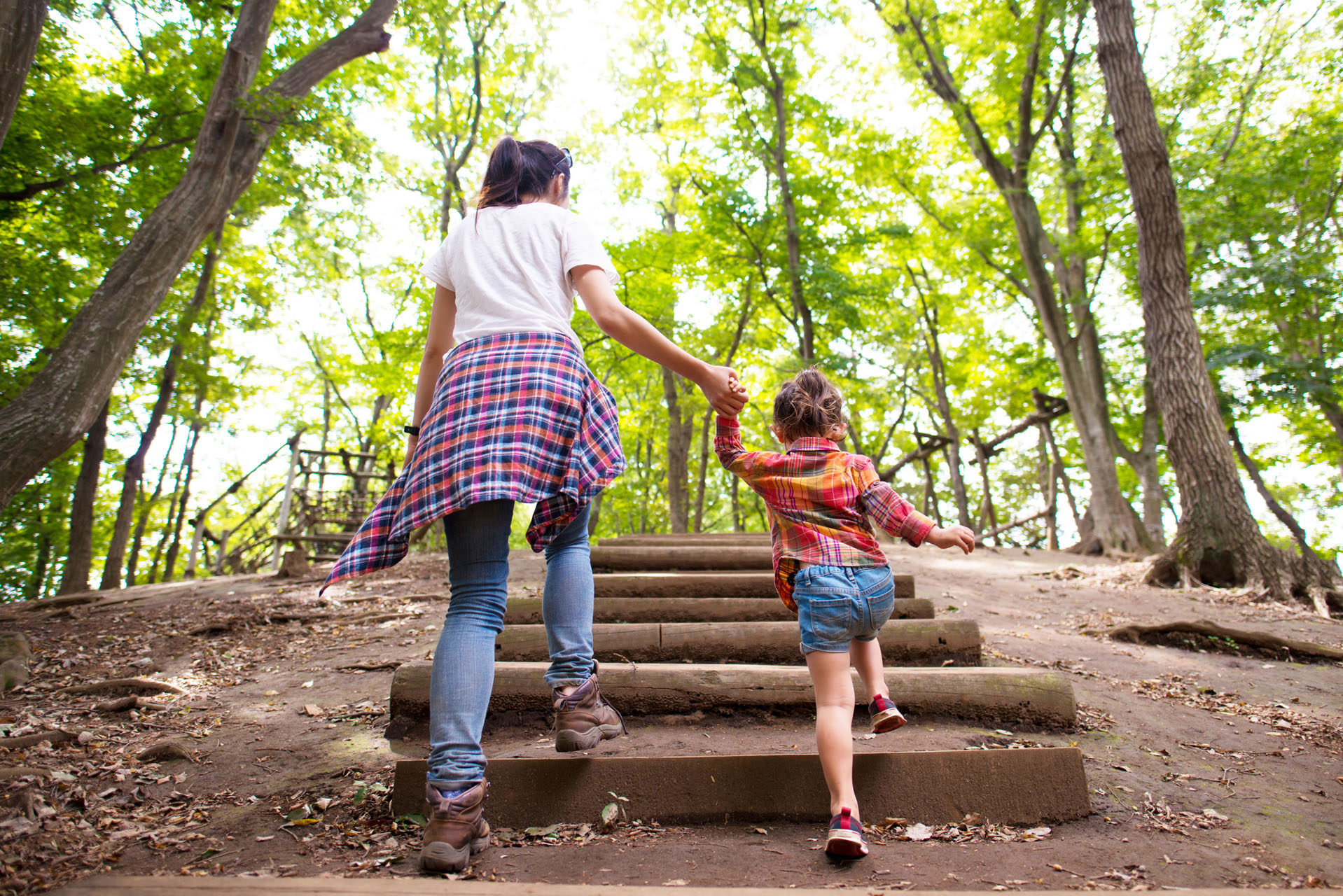Toddler
7 min Read
When’s the best age to tackle some big kid milestones

February 17, 2015
Toddler
7 min Read

February 17, 2015

Think your four-year-old can brush her pearly whites on her own? Pretty sure your seven-year-old is ready for an allowance? And when is the best age to broach the delicate topic of sex and puberty? While parenting manuals walk us through those early infant milestones such as when to introduce solids or start toilet training, some of the more nuanced ones are harder to gauge. So we asked the experts for sound advice on when to go for it.
Since swimming is a critical life and safety skill, the sooner the better. “Our Red Cross preschool program is designed with an entry level of children age four to six months,” says Shelley Dalke manager, national swimming and water safety programs for the Ottawa-based Canadian Red Cross. “And lessons at that age aren’t focused so much on swimming skills but more teaching parents how to interact with children in the water and how to keep them safe,” she says. That means helping parents determine what’s proper supervision around the water and how do you enter the water safely with your child?
And if you waited a little late and now they’re afraid of the water? Shelley suggests going into the water with them at first and gradually get them used to going in on their own. What’s important is that they eventually know how to swim comfortably and safely.
“We have water opportunities everywhere. Some people think they can just avoid the beach or pool, but kids get exposed to these environments through their own activities, so swimming is a fundamental skill all Canadians should learn,” says Shelley.
While parents often broach this around age seven, it largely depends on the child. Michele Borba, author of The Big Book of Parenting Solutions: 101 Answers to Your Everyday Challenges and Wildest Worries, offers some clues to watch for. “If your child can’t sleep through the night at your house, don’t expect they’ll do it someplace else,” she says. Or if they’re going to be up late at someone’s house and don’t usually last until 10 p.m., don’t expect a sleepover to go well. Instead, Michele suggests a trial run: a night at grandma’s for instance. Or if you do have any doubts, you could always offer to host the sleepover at your house.
According to Pat Frehlich, public relations and marketing for the Canadian Federation of Music Teachers Associations, “once a child is in school and has an attention span where they can sit and concentrate for half an hour, they know their alphabets and numbers, then that would be the best time. So some five-year-olds have the aptitude to do these things. For others, seven is good.”So, no need to rush! To find an accredited teacher in your province, go to the Canadian Federation of Music Teachers website at cfmta.org.
Age 13. Transport Canada is clear on when a child can sit in the front. It says children 12 and under should sit in the back seat of the car, regardless of height and weight. Raynald Marchand, general manager for the Ottawa-based Canada Safety Council stresses that it’s important that once kids move to the front, they continue to wear their seat belt properly as they did in the back seat. That means across the chest (not behind the chest or under the arm) and the bottom belt across the child’s hips (and not across the stomach).
Parents often start weaning children off the stroller around age three. “You can start pulling back gradually on using a stroller and let your child have the walking experience,” says parenting expert Michele Borba. However, it depends on your individual circumstances. For instance – do you have another child to tote around as well? Does your child tend to sprint away from you? Are you in the city or suburbs? For parents who have the space, wagons make a handy alternative to handle the frequent switch between walking and riding.
Age six is a good age to start doling your dollars out, says Gail Vaz-Oxlade, author of Money Rules. “That’s when kids able to begin to understand what an allowance is,” she says. “When they’re four or fi ve, it’s just money. They don’t understand the actions around it.” Gail suggests starting with a dollar per year of your child’s age – so a six-year-old would earn $6 (weekly or monthly depending on how you expect them to spend it). But then, tuck your wallets away. “It’s money you would normally spend on your kid anyway,” Gail says. “You’re putting it into their hands so they can learn how to handle spending.”
To set up good money habits, Gail suggests children put 10 percent of their allowance in the bank, another amount set aside for giving or charity, and then the rest is divided between mad money and planned spending. “In the early days, most of it will be mad money,” she says. “But at some point, your child will want something that requires more money than they get in a single week and that’s when you introduce the idea of planned spending. So you say ‘You want to buy that book and that book is going to take three to four weeks of your allowance.’ “
Make sure your child has tackled the sleepover first. “Whenever your child is comfortable going to a friend’s house, we usually up that by a year or two,” says Michele Borba, so eight or nine. “Because at an overnight camp, they don’t know anybody there and it can be a weekend or weeklong. Once again, some kids are ready at six years old and some aren’t ready until 14.”
If you are unsure, some camps offer a minicamp trial run of two to three days to see if the child can handle it.
Craig Naherniak, general manager, humane education for The British Columbia Society for the Prevention of Cruelty to Animals, encourages families to think about bringing animals into their houses. “There’s a real upside to having pets in the household – it can help develop empathy and build self-esteem and nurturing skills.”
Craig suggests age fi ve or six is a good time to expand your family with a canine sibling. “Five and six are okay to have a family pet, but there’s more responsibility for the parents to understand what is appropriate behaviour with the animal and what isn’t. By ages eight to 12, children have the capacity to develop empathy skills and can start handling sole responsibility. The child has to have a maturity level to understand how their actions impact the animal,” says Craig.
Some school curriculums start addressing this topic around grade four or five, or age nine or 10. However if it comes up earlier, you can talk about it in an age-appropriate way giving age-appropriate details (i.e. a six-year-old for instance won’t necessarily need all the details of how babies are made).
What’s important is starting early with the building blocks for the talk, says Michele Borba. “You want to talk body parts and often we start talking body parts at two, three and four,” she says. “Use real terms – as soon as you start using baby talk like pee-pee, it takes on a whole different connotation to the child. And it becomes harder for you as the parent to later on have the more difficult talks at 11, 12 and 13. You’re trying to lay the foundation for those future talks.”
Astrid Van Den Broek is a Toronto-based writer who is always wondering when to start new activities with her two children.
Originally published in ParentsCanada magazine, February 2015.